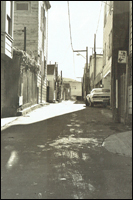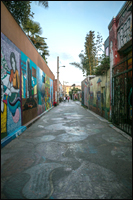Manifest Differently, the show at Minnesota Street Project will be having a closing ceremony on Saturday March 16th. Jointly curated by Kim Shuck and Megan Wilson, Manifest Differently takes on the harsh truth that we are currently living in a colonized reality. It asks how we can collectively heal. If you have not had a chance to see these powerful artists and their work I encourage you to go before it closes. I had the opportunity to speak with a few of the artists and their insights into their process informed me why this show makes such a powerful statement.
To begin with though, I would like to talk about Manifest Destiny. Once in fourth grade history class I saw the lithograph American Progress by John Gast. It shows a beautiful angel floating over a rolling green landscape. Dressed in flowing white robes, the blond angel carries wire and telephone poles. Below her, American settlers ride on horses. Farmers plow their fields. Trains and stagecoaches surge forward across the image. They are bathed in golden sunlight.
On the right side of the image, the scene darkens. A herd of buffalo run from the angel. A group of indigenous people on horses look back as they flee. This is an iconic illustration of the idea of Manifest Destiny, the 19th century phrase that proclaimed that settlers were destined to expand westward across North America. Not only does this image weaponize religion in support of genocide, the actions that came with it have left too many scars and shattered pieces.
Co-curator Kim Shuck thought a lot about the troubling legacy that histories like this leave on a public psyche. She also asks the question of the marks these ideas have on different communities. “I used to think that people knew that Indigenous women were killed or vanished in higher numbers than the general population and just weren’t doing anything about it. When I found out that most people didn’t know, it made me wonder what I didn’t know about other communities.” Says Shuck.
“I wanted to just ask creatives in different media to either express what effect the doctrine of discovery has had on their culture or how they would like to see their communities healed. I think in order to see good change we need to communicate better without a colonial lens in the way. I believe that social justice is possible, but that we need to know each other better. I saw Manifest Differently as part of that effort.” She continues.










